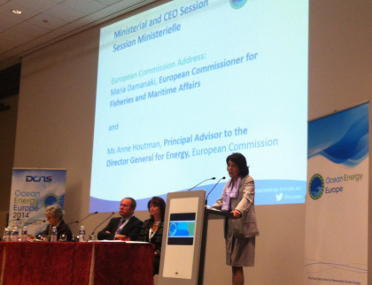Speech at the Ministerial and CEO panel session of the Ocean Energy Europe annual Conference

In parallel of the high-level meeting of the Ocean Energy Forum, Commissioner Damanaki addressed the panel session of the Ocean Energy Europe annual Conference 2014 in Paris. Read Commissioner Damanaki's keynote speech below.

Keynote speech – Ocean Energy Europe annual Conference 2014
Paris, 1 October
Good afternoon, ladies and gentlemen,
I'm pleased to be here and I thank the organisers for inviting me: we are on the cusp of a big change. This is a welcome opportunity to see where we've got so far, and plan for urgent delivery.
The President-elect Juncker has declared his ambition for the European Union to become the world's number one in renewable energy. He underlined the need to strengthen the share of renewable energies on our continent, as a matter of a responsible climate change policy and affordable energy in the medium term.
So I would say: get ready. This is the moment for you to act. This is the time to bet on ocean energy, the time to invest in the technology. One, the political context could not be better and two, you have the basis to move on now.
Let me expound on these two statements. Why the strong political support?
Well the sheer potential of covering our energy supply with ocean waves is a cogent argument, of course. Plus waves and tides are very predictable sources of energy, with no issue of intermittent electricity generation.
And we know that costs, however high, will come down steeply once the technologies are fully tested - as they have done for solar energy and wind.
So there is no doubt that wave and tidal energy should be part of our renewable energy mix.
Moreover Europe is already a global leader in producing ocean energy devices. Developing this sector means creating highly-skilled jobs locally and being able to export cutting-edge technologies globally. How about that?
Ocean energy has all it takes to become a success story in Europe's industrial renaissance.
Then there is also the issue of security of energy supply. We are regularly reminded of how important that is by events across our borders. By contrast, the waves and tides are ours – and ours alone. Think about it: having a secure, indigenous source of clean, low-carbon electricity that never runs out and that nobody can take away from us.
We must not lose sight of the big picture either. The EU has set itself a sustainability agenda, as well as the goal of transitioning to a low-carbon economy. If we are to reduce greenhouse gas emissions by 80 to 95% before 2050, as we have stated, ocean energy will have a definite role to play.
This is what I mean when I say the political support is there. The numbers make sense. And what is the EU doing concretely?
A couple of years ago we highlighted the importance of the sector in the Commission's Blue Growth Communication, and earlier this year we adopted a specific Communication on ocean energy. In it we stressed the potential of ocean energy, but also identified several important hurdles holding it back.
We immediately set up the Ocean Energy Forum: because we identified a real need for a place where governments, industry, financers and stakeholders are able to meet and work together in a structured way to discuss a strategic framework for the development of ocean energy sources. Working groups are already making progress and we just met with key ministers and CEOs from ocean energy companies to discuss the future work of the Forum.
The idea is for a strategic roadmap to see the light already in 2016. It should point at research priorities in the short, medium and long term, on which we can then align national and European R&D funding as well as private investments. A joint, synchronised effort will get us there faster.
Speaking of funds, EU support to the ocean energy sector is quite substantial.
• We have been funding ocean energy research since the late 1980s, with amounts increasing constantly and particularly in the last decade, for a total exceeding 90 million euro. For the coming years, the ocean energy sector is well placed to win funding from the new 80-billion Horizon 2020 programme.
• But some important projects - such as the recent SI Oceans - have also been funded through the Intelligent Energy Europe programme. And we are working closely and pooling resources with our Member States: for instance we created European Research Areas to work together on specific challenges, including the development of ocean energy.
• As recently as July of this year, three ocean energy projects were chosen to receive 104 million over the next few years through the NER300 programme. The European Investment Bank has several products to finance ocean energy projects, but has yet to receive any requests. Now the Bank is preparing funding for 'first-of-a-kind' demonstration projects in the field of energy, and that should clearly provide funding opportunities for ocean energy projects.
• The EU is also supporting ocean energy projects through the Structural Funds. Wales, for example, was clever enough to define marine energy as a specific objective in its Partnership Programme for the European Regional Development Fund. So I see money coming its way for relevant projects over the next seven years. In France, Basse-Normandie is using the European Regional Development Fund to transform the harbour of Cherbourg into an ocean energy hub.
In sum, ladies and gentlemen,
The EU has been investing in the ocean energy sector for quite a while now and that support is here to stay.
We believe that developing a wide array of clean, indigenous sources of energy is the best guarantee for a secure and sustainable energy supply.
We believe that ocean energy has a crucial role to play on the path towards a sustainable blue economy.
We must work harder to bring this industry to the phase of a commercial roll-out and it should get every possible opportunity to develop, deliver jobs and growth and propel us out of the crisis. So we are ready to do what it takes, which includes channelling the money to the right place at the right time.
It is up to you to grab the opportunity.
Thank you.


